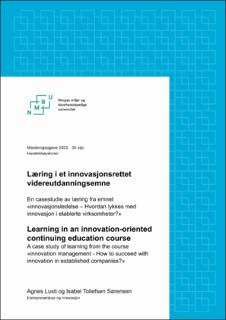| dc.contributor.advisor | Lunnan, Anders | |
| dc.contributor.advisor | Fjuk, Annita | |
| dc.contributor.author | Lusti, Agnes | |
| dc.contributor.author | Sørensen, Isabel Tollefsen | |
| dc.date.accessioned | 2022-10-19T11:50:06Z | |
| dc.date.available | 2022-10-19T11:50:06Z | |
| dc.date.issued | 2022 | |
| dc.identifier.uri | https://hdl.handle.net/11250/3027071 | |
| dc.description.abstract | The purpose of the study is to explore the learning outcomes of an innovation oriented continuing education course through a qualitative case study.
The case study was the course Innovation management - How to succeed with innovation in established companies (“Innovasjonsledelse - Hvordan lykkes med innovasjon i etablerte virksomheter”) carried out in autumn 2020. The course was organized by NHH Executive in a collaboration with DigitalNorway and Kunnskapsbyen Lillestrøm.
The focus of the study is “How can we understand individual learning and utilization from an innovation oriented course, and how has the course facilitated this?”
To understand the learning outcomes we use a conceptual model where we examine three elements and explore the connections between these: 1) Participants individual learning outcome, 2) Utilization of the learning outcome in a work context and 3) The course structure. Through the study we explore these three elements separately – and see how they affect each other. Key theories used to exemplify these topics are Haase & Lautenschläger’s (2011) framework for evaluating the effectiveness of entrepreneurial teaching, Kolb's (1984) learning cycle for experiential learning and Lave & Wenger (1991) theory of community of practice. To get a deeper understanding, we carried out eight in-depth interviews and examined written feedback from the course participants.
The study indicates that the course structure worked well, and had a positive impact on individual learning and utilization. The findings of the study indicate that the course has given the participants theoretical foundation and tools for their work with innovation. Thus we recognize the participants' innovation capacity has increased. Nevertheless, we see variation in the participants' individual learning outcome from the course, and the degree of perceived benefit in a work context.
The private and the public sector are both affected by constant change, with consequent need of innovation and development. To remain relevant, competitive and to avoid a competency gap, companies must secure resources for innovation and further education, which the study substantiates. | en_US |
| dc.description.abstract | Studiens formål er å undersøke læring fra et innovasjonsrettet videreutdanningsemne ett år etter emneslutt, gjennom en kvalitativ casestudie. Studiens case er emnet “Innovasjonsledelse - Hvordan lykkes med innovasjon i etablerte virksomheter” som ble gjennomført høsten 2020. Emnet ble arrangert av NHH Executive i samarbeid med DigitalNorway og Kunnskapsbyen Lillestrøm.
Studiens problemstilling er; “Hvordan kan vi forstå individuell læring og utnyttelse fra et innovasjonsrettet emne, og hvordan har emnets oppbygging fasilitert for dette?”
For å forstå læringen benytter vi en konseptuell modell hvor vi undersøker tre elementer og sammenhengen mellom disse: 1) Deltakernes individuelle læringsutbytte, 2) Utnyttelse av læringsutbyttet i arbeidskontekst og 3) Emnets oppbygging. Gjennom studien undersøker vi disse elementene hver for seg, i tillegg til å se hvordan de påvirker hverandre. Sentrale teorier som benyttes for å belyse disse temaene er Haase & Lautenschläger (2011) sitt rammeverk for entreprenørskapsutdannelse, Kolbs (1984) læringssirkel for erfaringsbasert læring og Lave og Wenger (1991) sin teori om praksisfellesskap. I besvarelsen av problemstillingen benyttes åtte dybdeintervjuer og sekundærdata i form av skriftlige tilbakemeldinger.
Studien gir indikasjoner om at emnets oppbygging har fungert godt, samt påvirket individuell læring og utnyttelse av læringsutbyttet positivt. Studiens funn tyder på at emnet har gitt deltakerne teoretisk forankring og verktøy i sitt arbeid med innovasjon. Dermed forstår vi at deltakernes innovasjonskapasitet har økt. Likevel ser vi store variasjoner i deltakernes individuelle læringsutbytte fra emnet og graden av opplevd nytte i arbeidskontekst.
Næringslivet og det offentlige preges begge av konstante endringer i omgivelsene, med etterfølgende forsterket behov for innovasjon og utvikling. For å forbli relevante, konkurransedyktige og unngå kompetansegap må bedrifter bruke ressurser på innovasjon og videreutdanning, noe studien underbygger. | en_US |
| dc.language.iso | nob | en_US |
| dc.publisher | Norwegian University of Life Sciences, Ås | en_US |
| dc.rights | Attribution-NonCommercial-NoDerivatives 4.0 Internasjonal | * |
| dc.rights.uri | http://creativecommons.org/licenses/by-nc-nd/4.0/deed.no | * |
| dc.title | Læring i et innovasjonsrettet videreutdanningsemne : en casestudie av læring fra emnet «innovasjonsledelse – Hvordan lykkes med innovasjon i etablerte virksomheter?» | en_US |
| dc.title.alternative | Learning in an innovation-oriented continuing education course : a case study of learning from the course «innovation management - How to succeed with innovation in established companies?» | en_US |
| dc.type | Master thesis | en_US |
| dc.description.localcode | M-EI | en_US |

